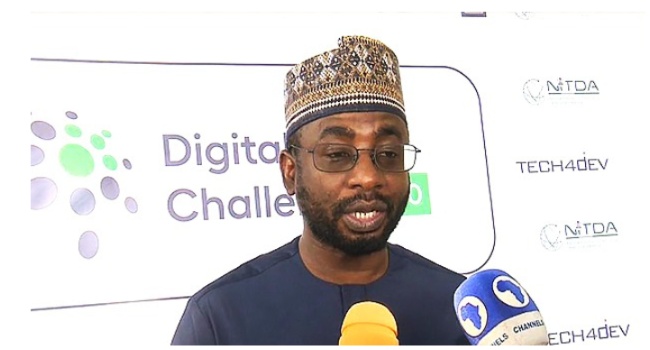
The Federal Government has made the announcement that it wants to give Nigerians at least 30 million citizens a specific training and empowerment goal by 2030 in order to reach 95 percent of the population.
At the Grand Finale of the Tech4Dev Digital for All Challenge 2.0, Kashifu Abdullahi, the director-general of the National Information Technology Development Agency, represented by Aristotle Onumo, the agency’s director of stakeholder management.
Abdullahi explained that NITDA is advancing the initiative through strategic alliances, particularly with the National Youth Service Corps and other educational institutions.
The NITDA’s vision is reflected in the DFA 2.0 competition. By 2030, we want to ensure that 95% of Nigerians are digitally literate. 30 million Nigerians will be trained and empowered by 2027. We can’t do it alone, he said, so we’re collaborating with partners.
READ MORE: FG HELPED TO SET up A MINIST for Artificial Intelligence
Abdullahi praised the NYSC’s role in training corps members to become digital literacy champions who are stationed all over the country.
“Digital Literacy Champions are currently educating citizens in every local government area of Nigeria. He continued, “Our portal also provides real-time data on how many Nigerians have been trained thus far.
He added that NITDA has successfully integrated digital literacy into the national curriculum across all educational levels in collaboration with the Ministry of Education.
“Digital literacy was recently made a part of the curriculum for all secondary, tertiary, and primary institutions. For instance, the General Studies program at Nasarawa State University includes digital literacy. He explained that by the end of their first year, students are certified by Cisco and equipped to use the digital economy.
According to Abdullahi, civil servants are also being targeted to increase effectiveness and service delivery.
Digital literacy is now a required component of promotion exams for civil servants. He remarked, “This is another step toward achieving our goal of a nation that is digitally literate by 2027.”
The Digital for All Challenge was described as a “shared vision,” according to the NITDA boss, who praised Tech4Dev’s partnership.
“We think that the 21st century will need more digital literacy.” We are laying the groundwork for innovation, job creation, and long-term prosperity with the right digital skills. Because 400 NITDA employees alone cannot reach 270 million Nigerians, partnerships like this are crucial, he said.
The winners of the challenge were commended, but Abdullahi urged them to view the event as a tool for transformation rather than just a competition.
This is a transformation as opposed to just a competition. The young entrepreneurs we are celebrating today are using digital tools for nation-building and empowerment. He said, “We create the future through knowledge, courage, and collaboration, not something we wait for.”
He emphasized that all Nigerians should use digital technology, not just for the youth.
Nkeiruka Onyejeocha, the minister of state for labor and employment, reiterated the government’s commitment to advance digital literacy by highlighting its significance for both national development and job creation. She urged more young people to take active part in these initiatives.
Idongesit Udoh, the country lead for the UK’s International Development Digital Access Programme and Idongesit Udoh, praised the initiative as “a really significant digital-for-all challenge” and described it as a landmark project that has expanded access to digital skills across the country.
In the digital era, Udoh emphasized that everyone must have access to technology to ensure that no one is forgotten.
A modern digital economy’s foundations are skills, connectivity, and trust, and this project has advanced all three, he said.
He noted that the competition has also led to increased opportunities for young people, civil servants, and emerging leaders.
It has given young people the opportunity to compete both domestically and internationally. It has improved the delivery of services for civil servants. It has already opened up digital journeys for teenagers and children. And it has rewarded and inspired many, he continued, “with its awards and certifications.”
Oladiwura Oladepo, a co-founder of Tech4Dev, highlighted the positive effects of the Digital for All Challenge, noting that nearly 18, 000 youths in Nigeria were benefited directly from the first edition.
She explained that the second edition aimed to advance digital literacy, increase individual empowerment, and provide opportunities for people from all socioeconomic backgrounds, ages, and classes.
In addition to the Youth Intermediate category, which included young learners between the ages of 8 and 18, participants explored areas like cybersecurity, product design, data analysis, digital and social media marketing, and software development, as well as a dedicated Civil Servants category, which aimed to increase digital capacity among government employees for more effective service delivery.
“This program has had an impact on Nigerians everywhere, giving them the skills they need to thrive in a world where technology is at its core.” I can proudly report on the accomplishments we have made in achieving that vision today. Through awareness campaigns, training sessions, assessments, and competitions, over one million Nigerians have been reached at various stages of this challenge, according to Oladepo.
Source: Channels TV

Leave a Reply